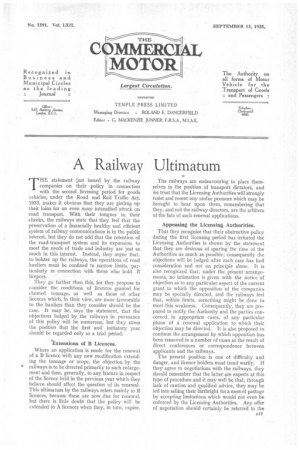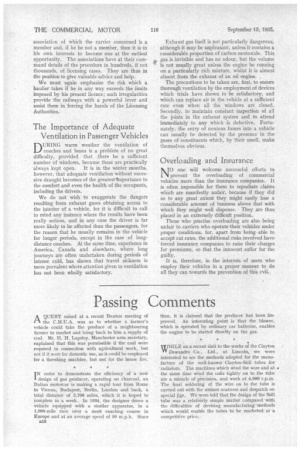A Railway Ultimatum
Page 27

Page 28

If you've noticed an error in this article please click here to report it so we can fix it.
THE statement just issued by the railway companies on their policy in connection with the second licensing period for goods vehicles, under the Road and Rail Traffic Act, 1933, makes it obvious that they are girding up their loins for an even more intensified attack on road transport. With their tongues in their cheeks, the railways state that they feel that the preservation of a financially healthy and efficient system of railway communications is in the public interest, but they do not add that the retention of the road-transport system and its expansion to meet the needs of trade and industry are just as much in this interest. Instead, they argue that, to bolster up the railways, the operations of road hauliers must be confined to narrow limits, particularly in connection with those who hold B licences. , They go farther than this, for they propose to consider the conditions of licences granted for claimed tonnage, as well as those of other licences which, in their view, are more favourable to the hauliers than they consider should be the case. It may be, says the statement, that the objections lodged by the railways in pursuanCe of this policy will be numerous, but they stress the position that the first and initiatory year should be regarded only as a trial period.
'Extensions of B Licences.
Where an application is made for the renewal of a B licence with any new modification extending the tonnage or scope, the objection by the • railways is to be directed primarily to such enlargement and then, generally, to any feature in respect of the licence held in the previous year which they believe should affect the question of its renewal. This ultimatum by the railways refers mainly to B licences, because these are now due for renewal, but there is little doubt that the policy will be extended to A licences when they, in turn, expire. The railways are endeavouring to place themselves in the position of transport dictators, and We trust that the Licensing Authorities will strongly resist and resent any undue pressure which may be brought to bear upon them, remembering that they, and not the railway directors, are the arbiters of the fate of such renewal applications.
Appeasing the Licensing Authorities.
' That they recognize that their obstructive policy during the first licensing period has irritated the Licensing Authorities is shown by the statement that they are desirous of sparing the time of the Authorities as much as possible; consequently the objections will be lodged after each case has had consideration and not on principle alone. It is also recognized that, under the presentarrangements, no intimation is given with the notice of objection as to any particular aspect of the current grant to which the opposition of the companies may be specially directed, and the railways feel• that; within limits, something might be done to meet this weakness. Consequently, they are prepared to notify the Authority and the parties concerned, in appropriate cases, of any particular phase of a renewal application to which their objection may be directed. It is also proposed to continue the arrangement by which opposition has been removed In a number of cases as the result of direct conferences or correspondence between applicants and the railways.
The present position is one of difficulty and danger, and licence holders must tread warily. If they agree to negotiations with the railways, they should remember that the latter are experts at this type of procedure and it may well be that, through lack of caution and qualified advice, they may be led into selling their birthright for a mess of pottage by accepting limitations which would not even be enforced by the Licensing Authorities. Any offer of negotiation should certainly be referred to the association of which the carrier concerned is a member and, if he be not a member, then it is in his own interests to become one at the earliest opportunity. The associations have at their command details of the procedure in hundreds, if not thousands, of licensing cases. They are thus in the position to give valuable advice and help.
We must again emphasize the risk which a haulier takes if he in any way exceeds the limits imposed by his present licence; such irregularities provide the railways with a powerful lever and assist them in forcing the hands of the Licensing Authorities.
The Importance of Adequate Ventilation in Passenger Vehicles
DURING warm weather the ventilation of coaches and buses is a problem of no great difficulty, provided that there be a sufficient number of windows, because these are practically always kept open. It is in the winter months, however, that adequate ventilation without excessive draught becomes of the greatest finportance to the comfort and even the health of the occupants, including the drivers.
We do not wish to exaggerate the dangers resulting from exhaust gases obtaining access to the interior of a vehicle, for it is difficult to call to mind any instance where the results have been really serious, and in any case the driver is far more likely to be affected than the passengers, for the reason that he usually remains in the vehicle for longer periods, except in the case of longdistance coaches. At the same time, experience in America, Canada and elsewhere, where long journeys are often undertaken during periods of intense cold, has shown that travel sickness is more prevalent where attention given to ventilation has not been wholly satisfactory. Exhaust gas itself is not particularly dangerous, although it may be unpleasant, unless it contains a considerable proportion of carbon monoxide. This gas is invisible and has no odour, but the volume is not usually great unless the engine be running on a particularly rich mixture, whilst it is almost absent from the exhaust of an oil engine. , The precautions to be taken are, first, to ensure thorough ventilation by the employment of devices which trials have shown to be satisfactory, and which can replace air in the vehicle at a sufficient rate even when all the windows are closed. Secondly, to maintain constant inspection of all the joints in the exhaust system and to attend immediately to any which is defective. Fortunately, the entry of noxious fumes into a vehicle can usually be detected by the presence in the gases of constituents which, by their smell, make themselves obvious.
Overloading and Insurance
NO one will welcome successful efforts to prevent the overloading of commercial vehicles more than the insurance companies. It is often impossible for them to repudiate claims which are manifestly unfair, because if they did so to any great extent they might easily lose a considerable amount of business above that with which they might well dispense. They are thus. placed in an extremely difficult position.
Those who practise overloading are also being unfair to carriers who operate their vehicles under proper conditions, for, apart from being able to accept cut rates, the additional risks involved have forced insurance companies to raise their charges for premiums, so that the innocent suffer for the guilty.
It is, therefore, in the interests of users who employ their vehicles in a proper manner to do all they can towards the prevention of this evil.




















































































